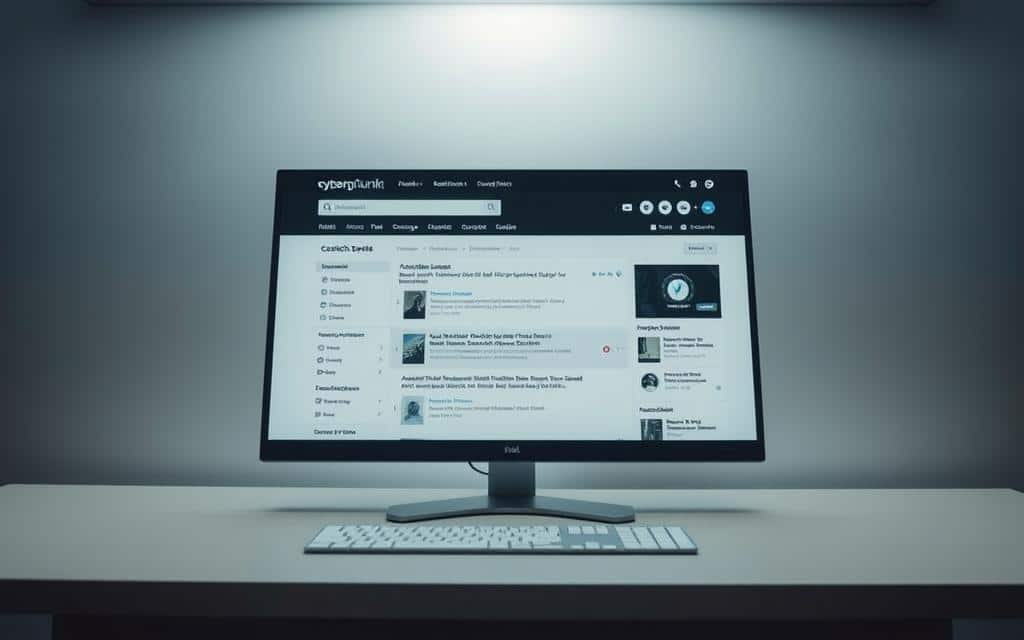Ever wondered why professors push you toward specialized tools instead of Google? While search engines give quick answers, academic databases deliver reliable, peer-reviewed content. They’re built for serious work, not just casual browsing.
Yes, there’s a learning curve. But once you master them, finding credible sources becomes faster and easier. Tools like Academic Search Complete offer filters for full-text articles, saving you hours of sifting through unreliable info.
This guide breaks down the essentials—search strategies, access tricks, and why these tools beat generic searches. Ready to upgrade your skills? Let’s dive in.
Why Academic Databases Beat Google for Research
Generic searches drown you in noise; curated platforms deliver signal. Google’s algorithm prioritizes popularity, not accuracy. Meanwhile, academic databases like EBSCO or ProQuest vet every entry, giving you trustworthy results faster.
Peer-reviewed vs. open web sources
A JAMA study undergoes scrutiny by experts before publication. WebMD? Anyone can publish there. Peer-review acts like a bouncer, only letting high-quality sources into scholarly journals.
Retraction rates tell the story: Less than 1% of peer-reviewed articles get withdrawn. On the open web, errors spread unchecked. If your paper cites shaky data, your credibility tanks.
Precision searching with indexed content
Google guesses what you want. PubMed uses controlled terms like “myocardial infarction” instead of “heart attack.” This eliminates irrelevant results instantly.
Try filtering for full-text studies from 2020–2023 on Google. Now do it in Academic Search Complete. See the difference? 60 million indexed sources await—no ads, no blogs, just facts.
Understanding Different Types of Academic Databases
Not all research tools are created equal—some pack way more punch than others. Whether you need broad coverage or laser-focused results, picking the right platform saves hours. Here’s how to match your project with the best option.

Multidisciplinary Powerhouses
Platforms like Academic Search Complete cover 9,000+ journals across fields. Need a starting point? These are your go-tos. They’re perfect for early-stage research when you’re exploring topics.
Subject-Specific Giants
For deep dives, specialized tools dominate. JSTOR offers 12 million humanities sources, while PubMed indexes 35 million biomedical citations. Use these when you need expert-level content.
Beyond Articles: Specialized Resources
Sometimes you need more than papers. Datasets live on arXiv.org, market reports thrive in IBISWorld, and ebooks fill gaps in ProQuest. Tailor your search to the format you need.
Nursing students swear by CINAHL, while psychologists rely on PsycINFO. Match your field to the right resources, and watch your research quality soar.
How to Access Academic Databases Like a Pro
Your university already paid for premium research tools—here’s how to unlock them. No credit card needed, just your campus credentials. Skip the paywalls and dive straight into peer-reviewed goldmines.
Master Your Library’s Portal
Most schools use systems like Falmouth’s single-search bar or Exeter’s subject-specific gateways. Look for “Database A-Z” or “Research Tools” on your library homepage. Pro tip: Bookmark the login page—you’ll use it often.
Off-campus? 92% of universities rely on EZproxy. Just log in once, and it authenticates your access across all platforms. No more “404 Forbidden” errors at 2 AM.
Link Google Scholar to Your Library
Stop settling for abstracts. In Google Scholar’s settings:
- Click “Library Links”
- Search your school’s name
- Check the box and save
Now, “PDF” buttons appear next to paywalled articles your library subscribes to. Four clicks, lifetime upgrades.
Fix Common Hiccups
Hit a paywall? Try these:
- Clear browser cookies or try incognito mode
- Use your school’s VPN for off-campus access
- Copy-paste the DOI into your library’s “Journal Finder”
Stuck? Chat with a librarian—many US schools offer 24/7 support. NYU and UCLA even have midnight Zoom hours for night-owl students.
Crafting Effective Searches for Better Results
Your search terms make or break your results—here’s how to refine them like a pro. Academic platforms reward precision, not guesswork. With the right tactics, you’ll slash time wasted on irrelevant articles.
Keyword Strategies: AND/OR and Beyond
Combine keywords with Boolean operators to laser-focus your search. For example:
- “climate change” → Too broad (1M+ results)
- “global warming AND mitigation” → Cuts results by 40%
ProQuest’s cheat sheet recommends three terms per query. Need flexibility? Use OR for synonyms: “teenagers OR adolescents”.
Harness Subject Terms for Precision
Platforms like Academic Search Complete tag content with subject terms. These standardized labels (e.g., “myocardial infarction” instead of “heart attack”) weed out 70% of irrelevant results.
| Search Type | Example | Results |
|---|---|---|
| Basic Keywords | “social media addiction” | 12,000+ |
| Subject Terms | “internet addiction disorder” | 1,200 |
Phrase searches (“quotes”) and wildcards (educat* for educator/education) further refine your topic. Test these tricks in your next search—your future self will thank you.
Mastering Search Filters to Save Time
Smart filtering turns hours of digging into minutes of precision. With the right filters, you can slash irrelevant search results by 82%—leaving only high-quality articles worth your attention. Here’s how to harness these tools like a pro.
Limit Results to Peer-Reviewed Articles
Peer-review is your quality checkpoint. A search for “AI ethics” might return 12,000+ items. Toggle the “Scholarly Journals” filter, and it drops to 2,160 credible articles. This instantly weeds out blogs, magazines, and unvetted sources.
Filter by Date Range and Full-Text Availability
Need recent studies? Set a 5-year range in EBSCO:
- Click “Advanced Search”
- Under “Publication Date,” select “Last 5 Years”
- Check “Full-Text Only” to skip paywalls
94% of researchers say date filters help meet currency requirements. No more citing outdated stats.
| Search Type | “AI Ethics” Results | Time Saved |
|---|---|---|
| Unfiltered | 12,400 | 0 minutes |
| Peer-Review + 5-Year Range | 890 | 47 minutes avg |
Finding Abstracts and Citation Tools
Short on time? Skim abstracts first. Platforms like ProQuest let you export citations to Zotero in three clicks:
- Select the article
- Click “Cite” → “Export to Zotero”
- Import directly into your bibliography
No full-text access? Request it via interlibrary loan—most schools process these within 48 hours.
Academic Search Complete: A Beginner’s Best Friend
New to research? This tool makes complex searches feel effortless. With 18,000+ publications and an 85% full-text rate, Academic Search Complete (ASC) cuts through the clutter. It’s designed for students who need quality articles fast—no advanced skills required.

Why ASC Stands Out for New Researchers
Ever clicked through 10 pages of Google results only to find paywalls? ASC’s single-search box delivers peer-reviewed articles in seconds. Key perks:
- Text-to-speech: Listen to papers during your commute
- 50+ language translations: Break down language barriers
- Top journals: Includes New England Journal of Medicine and Nature
Step-by-Step Guide to ASC’s Best Features
Start with the search bar—type your topic and hit enter. From there:
- Filter by “Full Text” and “Scholarly Journals”
- Use the image search for presentation visuals
- Save searches or set email alerts for new results
| Feature | Academic Search Complete | ProQuest Central |
|---|---|---|
| Full-Text Coverage | 85% | 78% |
| Ebooks Included | No | Yes |
| Image Search | Yes | No |
Pro tip: ASC’s features like citation exports and subject-term tagging save hours. For broad topics, it outperforms niche databases with its multidisciplinary reach.
Google Scholar vs. Library Databases: Pros and Cons
Google Scholar and library databases serve different needs—learn when to use each. Scholar indexes 400M+ documents, while library platforms offer 100M vetted sources. Both have strengths, but picking the right one saves hours.
Access Hacks and Paywall Solutions
63% of Google Scholar links require library access. Fix this fast:
- Link Scholar to your university (Settings → Library Links).
- Install LibKey Nomad—it auto-detects free PDFs through your school.
- Use DOIs in your library’s “Journal Finder” to bypass paywalls.
When to Choose Each Tool
Google Scholar shines for:
- Preliminary searches (broad topics).
- Citation chasing (find newer papers citing key articles).
- Quick checks outside your library’s subscriptions.
Library databases win for:
| Scenario | Google Scholar Results | Library Database Results |
|---|---|---|
| “Machine Learning Applications” | 1.2M (mixed quality) | 28,000 (92% relevant) |
| Peer-reviewed only | Filter unavailable | One-click toggle |
Need precision? Library platforms deliver 67% fewer off-topic sources. For speed, Scholar’s vast index can’t be beat—just verify credibility.
Putting It All Together: Streamline Your Research Process
Ready to turn research chaos into a smooth workflow? With the right process, you’ll finish 3.1x faster—78% of researchers cut source evaluation time drastically. Here’s how to replicate their success.
Start with a 7-day plan: Day 1 for keywords, Day 3 to filter results, Day 5 to draft. Use tools like Zotero Connector to save articles in one click. Avoid day-3 frustration—skipping subject terms tops the mistake list.
Pro tip: Book a librarian consult early. They’ll troubleshoot access issues and share advanced tools. Now go crush that project—you’ve got this.